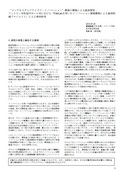Economic Development using an Enabling Environment for Contextualized Innovation: The Case of the "Poverty Reduction Project by Building-up the Innovation Environment Using FabLab," Bohol Province, The Philippines

With Internet access and 3D printers, laser cutters and other machine tools, FabLabs are workshops that aim to allow manufacturing to solve the problems of local communities and individuals while learning from the world. This paper will attempt, by verifying a specific case, to look at economic development through FabLab-based innovation in two aspects: to clarify whether rural communities of developing countries in particular can make good use of FabLabs, and what factors affect the effectiveness of this approach.
The verified case is "Poverty Reduction Project by Building-up the Innovation Environment Using FabLab" in which the author, as a Japan Overseas Cooperation Volunteers (JOCV), got involved as the project leader for two years and four months from planning to startup of the FabLab on the island of Bohol in the Philippines.
This paper defines innovations not have to be solely the research and development of products and services that can be accepted in the global market, but ones that could improve the welfare of a small local area, including their impact on the effectiveness and efficiency of particular institutions or the lives of particular individuals in that particular locality. The author says, "In a case where development cooperation agencies consider measures for economic development, they need to focus on the local people, on community-based institutions and on local economies. What is needed here is therefore contextualized innovation that brings breakthroughs or improvements to the status-quo of each group of local people.".
In Bohol, it is apparent that medium- and small-sized enterprises are manifesting new innovation using the digital fabrication equipment of the FabLab opened there. Based on this observation, the author concludes that innovation-led economic development is applicable not only to major cities, but is also important to small cities in developing countries, and this can be achieved by creating an enabling environment for innovations with FabLabs.
This paper was commissioned by the JICA Research Institute.
scroll